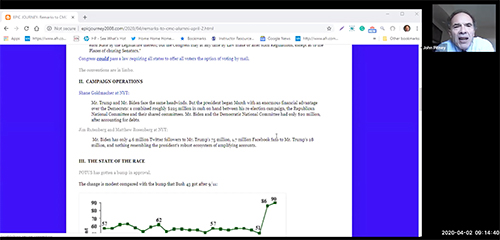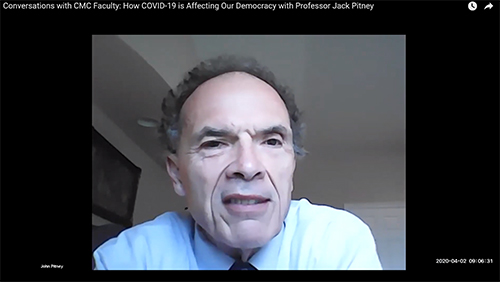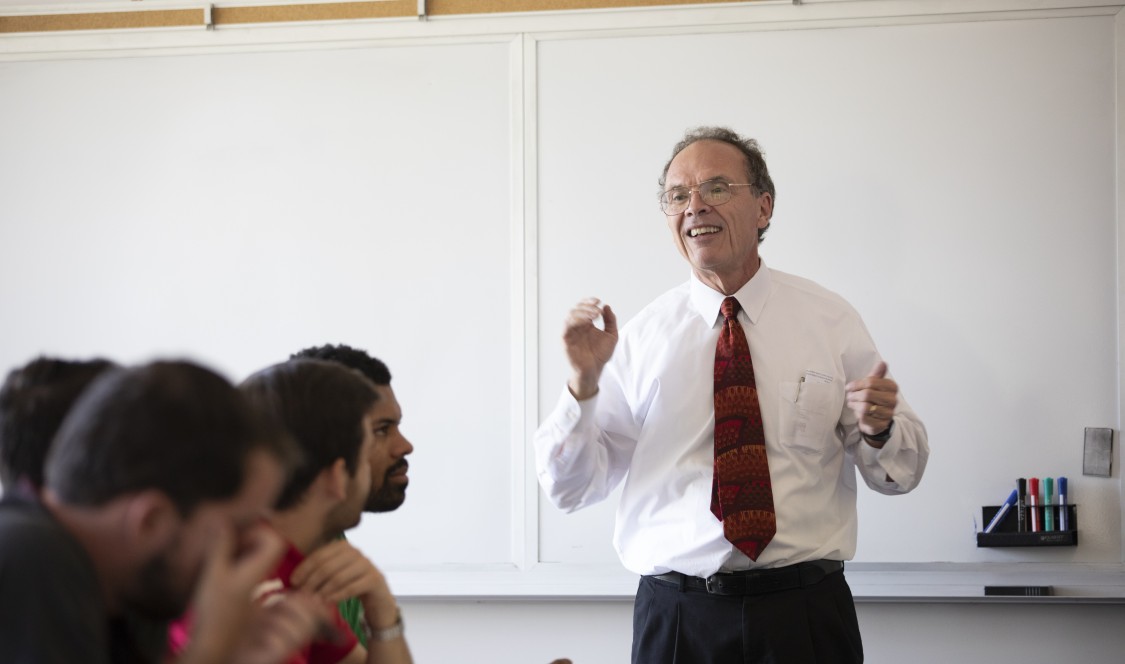Can Donald Trump cancel the November election?
That was the intriguing question asked-and-answered by Claremont McKenna College presidential campaign expert John J. Pitney Jr. in a remote lecture held last Thursday, with 200 curious alumni and parents in virtual attendance.
Pitney, who is the Roy P. Crocker Professor of American Politics, gave an unequivocal “no.”
“Here’s the deal, as Joe Biden would say. The constitution sets terms of office, no exceptions. The term of the president and vice president will end at noon on January 20. Period. The terms of members of Congress will be up January 3.”
Pitney’s talk was the first in a series of Zoom-based intellectual exchanges called “Conversations with Faculty.” The inaugural session drew participants from as far afield as Peru and Switzerland.
A respected conservative commentator and authority on American politics, Pitney has written a series of books on the last three presidential races: Defying the Odds (2017), After Hope and Change (2013) and Epic Journey (2009). He and CMC government professor Andrew Busch are currently working on a fourth in the series focused on the 2020 election cycle. Pitney’s forthcoming book, to be released later this month, is a “scathing indictment" of the incumbent, titled Un-American: The Fake Patriotism of Donald J. Trump.
While Trump can’t cancel the election, Pitney noted, the U.S. Congress has the constitutional authority to postpone it—but only by a couple of weeks. To ensure a smooth transition by January, they must begin to choose electors in December.
For the sake of argument, Pitney entertained the unlikely scenario of a cancelled election due to some unforeseen event. What happens then?
“Well, the terms still end,” he said. “The House would be de-populated; we wouldn’t have a president. Two-thirds of the Senate would still be there.” Next in line for the presidency is the Senate president pro tempore, Republican Sen. Chuck Grassley. But with a third of the upper chamber gone, the Democrats could gain the majority in January, making the acting president Sen. Pat Leahy.
“Now we’re way out in science fiction,” Pitney noted, with a grin. “That’s almost certainly not going to happen. The question is realistically, what can Congress do? Can Congress require mail ballots? Yes. Would Congress do so? There’s a lot of opposition on the Republican side, but a number of states are already moving in that direction. So, we’re going to have a lot of voting by mail in November.”

During his 30-minute presentation, Pitney weighed the various advantages and disadvantages the coronavirus crisis brings to the candidates and their political parties.
“This will be a fascinating time to be studying the election,” he said.
Even as he was speaking, news broke that the Democratic National Convention had been postponed to mid-August. The delay, and a possible decision to hold the quadrennial gatherings virtually, won’t have a profound impact on the election, he predicted. “Fortunately for the legitimacy of the process, the conventions themselves are no long decision-making bodies. They exist mostly to ratify the results of the primaries and caucuses.”
In other topics, Pitney assessed the “rallying round the flag effect” of the coronavirus pandemic, contrasting Trump’s modest approval gains (up 3 percentage points) with previous surges in presidential popularity during national crises, such as after the September 11 attacks, the Cuban missile crisis and the invasion of Pearl Harbor.
“The question is: Why is Trump’s rally effect as modest as it is? And the answer is: polarization. People are really, really dug-in on Trump,” he said.
A related anomaly: “It is very unusual in the early days of a crisis for reactions on either side to be as partisan as they are now,” Pitney observed. “You did not see this in the days after 9/11. In fact, after Bush gave his speech to a joint meeting of Congress, there’s a picture of then-Senate majority leader Tom Daschle hugging him. That didn’t happen this time.”
Pitney reflected on the extraordinary constraints that social distancing imposes on both candidates. With rallies effectively banned, Trump is denied his strongest public forum. Joe Biden is even harder hit, losing much of his ability “to get in the public eye.”

On the campaign finance side, Pitney gave Trump a strong advantage, though fundraising will be much harder for all political contenders with the donor class jittery over gyrations in the stock market. Mike Bloomberg, he noted, has walked back his promise to generously bankroll the Democrats.
However, financial distress in general favors the Democrats. “If the election is decided simply on the state of the economy in the second quarter, Trump is going to lose,” Pitney said, basing that assessment on political scientist Alan Abramowitz’s time-for-change model, a predictor that has been dead-on in every presidential cycle except 2016. (The model gave Trump the electoral college win, but inaccurately also gave him the popular vote majority.)
Pitney cautioned that there are many other wildcards in play. “The conditions of this election are far from normal,” he said. For example:
- “How are people going to judge Trump’s handling of coronavirus? Will they grade him on a curve? That remains to be seen.”
- “He’s on the air every day. He may well be on the air through the summer at least. And a lot of Americans are watching and approving of what they see. That works to his advantage.”
- “The president has a tremendous fundraising and social media advantage."
- “We don’t know what turnout will be.”
The event was hosted by the Office of Alumni and Parent Engagement. After Pitney’s presentation, more than a dozen alumni had a chance to ask questions. Amy Berg ’08 of Providence, R.I., wanted to know if an election dominated by vote-by-mail, which normally favors Democrats, might work to Republicans’ advantage in a pandemic year because seniors, who tend to lean Republican, would otherwise hesitate going to polling stations.
Another participant, Ada Hand, asked if Biden should get equal screen time to balance Trump’s nightly press briefings. Candace Valenzuela ’06, a candidate in the Texas 24th Congressional District, asked how the wealth disparity between Democratic and Republican campaign war chests would affect down-ballot elections. Other participants asked Pitney to weigh in on whether Trump might replace Pence on the ticket and to assess CMC alum and Montana Gov. Steve Bullock’s ’88 chances of winning his Senate race or being selected as Biden’s running mate.
The full talk and question-answer session is archived here. Upcoming Zoom sessions in the “Conversations with Faculty” series:
- “Imagination During a Pandemic,” Professor Amy Kind
Friday, April 10 | 11 a.m. - “The Impact of the Novel Coronavirus on our Relationship with China,” Professor Minxin Pei P'12
Thursday, April 16 | 2 p.m. - “Leadership in Crisis,” Professor Ron Riggio P'10
Tuesday, April 28 | 4 p.m.
For more information, go to online.cmc.edu/events/alumni-events-page.
—Diane Krieger

